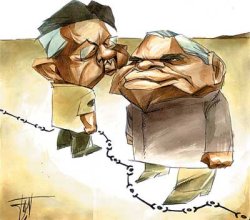
It is a bit sickening to have another
attack in Bali, but it seems especially this way because it's close to home again. I tried to get a perspective on the scale of this latest tradgedy in Bali and noticed that according to Wikipedia this is one of
eleven major
* terrorist attacks around the world
so far this year (three in Israel).
– Thirteen major attacks are listed
in 2004 (two in Egpyt, two in Iraq, two in Israel)
– Ten major attacks are listed
in 2003 (five in Israel)
– Ten major attacks are listed
in 2002 (three in Israel)
– Ten major attacks are listed
in 2001 (three in USA, seven in Israel)
So my thoughts turned to Israel again and I was reminded of one of the best articles I've read about terrorism in Israel by Ami Isseroff:
Wafa the hospital bomber. Of course, this is about the worst of the worst -- attempting to blow up a hospital where you are to receive free treatment! But some other "acts of terrorism" aren't as easy to condemn somehow. I think it is easy to be tempted to wonder if terrorism is sometimes justified, but really it is
not justifiable and I congratulate Isseroff on his article which makes this compellingly clear.
Probably violence is never morally justifiable, but clearly indiscriminate brutality against civillians is absolutely not morally justifiable. In fact I'd put certain aspects of the invasion of Iraq as well as the Iraqi insurgency into this category. Terrorism doesn't build any kind of confidence, doesn't relieve any tensions, doesn't achieve anything - its aim is to create terror. How can this ever be justifiable? I used to ask myself if Palestinian people felt they were in such a desperate situation that they simply had no option to make people aware of their plight except through bombings. Harsh as it sounds though, every individual and every ethnic/social groups are free to choose how to try and broker peace where there is conflict. Just because you are a minority doesn't actually excuse violence or terrorism. The same should apply to the Israeli Defence Force except that we tend to make exception in the case of national defence forces. No doubt this is a source of great frustration and unfairness for Palestinian people but it still
cannot justify terrorism.
What about Bali and the talking heads encouraging us to keep visiting Bali so we're not "giving in to the terrorists"? Well it sounds like a cliché now, but I suppose it's still true. I was impressed with how sensitively people around me reacted to the
Maxim Restaurant bombing in Haifa in 2003 when I was in Israel (well most of them). I'm sure most people would not think we have much to learn from Israel in terms of responding to terrorist attacks but I had the good fortune to be in the presence of both Arab and non-Arab Israelis in Haifa at this time and their response was to look at the attack (which killed 19 people including a baby) in terms of the noting the lessons to be learned and then continuing life making our best effort as individuals to understand the causes and envision a future of greater confidence and understanding between Israel and Palestine. To me this is the best way we can respond to terrorism: with our minds genuinely oriented towards this kind of 'peace-building' activity; not responding with fear, not responding with violence, nor going the other way and responding by justifying the terrorism or glorying in the fear the attack created.
But here in Australia following this attack, we should go beyond even this response. As usual Howard frustratingly had a far better response than any other politician: he noted that we should use this as an opportunity to build more bridges with Indonesia [my words]. (Damn his strategy-man is good! :( Or maybe he has just been in the game long enough to know the exact right thing to say). I definitely agree anyway, and hope that we can build public pressure to make this really happen. Massive exchange programs with students from all over Indonesia and Australia might be nice. Perhaps extend this to PNG too so it facilitates more meetings between young Papuans and Indonesian and Aussie youths...
Technorati Tags: terrorism, Bali bombings, Indonesia, Australian politics, terrorist attack, Israel, Palestine, Australia
 The downloads of Firefox have surpassed 100 million. This news makes me happy and I take this opportunity to give Firefox another plug at the top of my blog! :)
The downloads of Firefox have surpassed 100 million. This news makes me happy and I take this opportunity to give Firefox another plug at the top of my blog! :) We were talking about digital identity not too long ago. It started when Malcolm Turnbull got a drop of publicity from a suggestion that
We were talking about digital identity not too long ago. It started when Malcolm Turnbull got a drop of publicity from a suggestion that 









